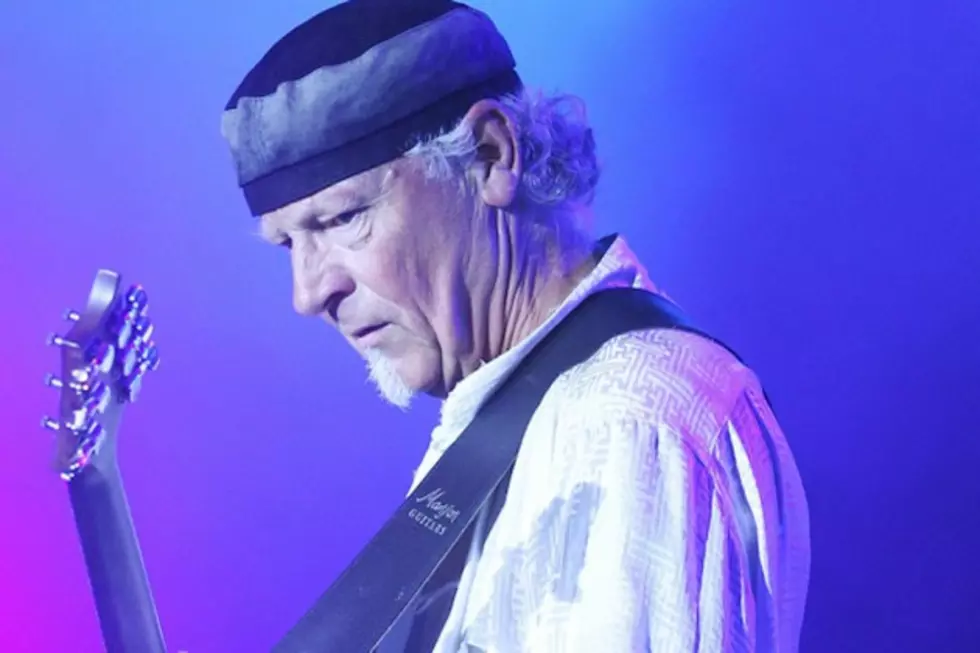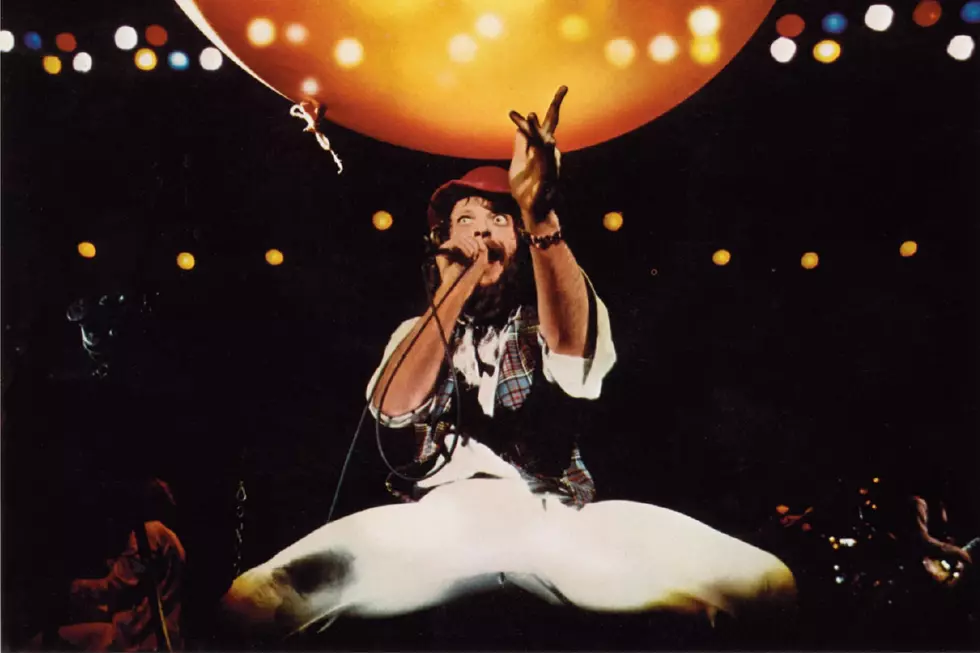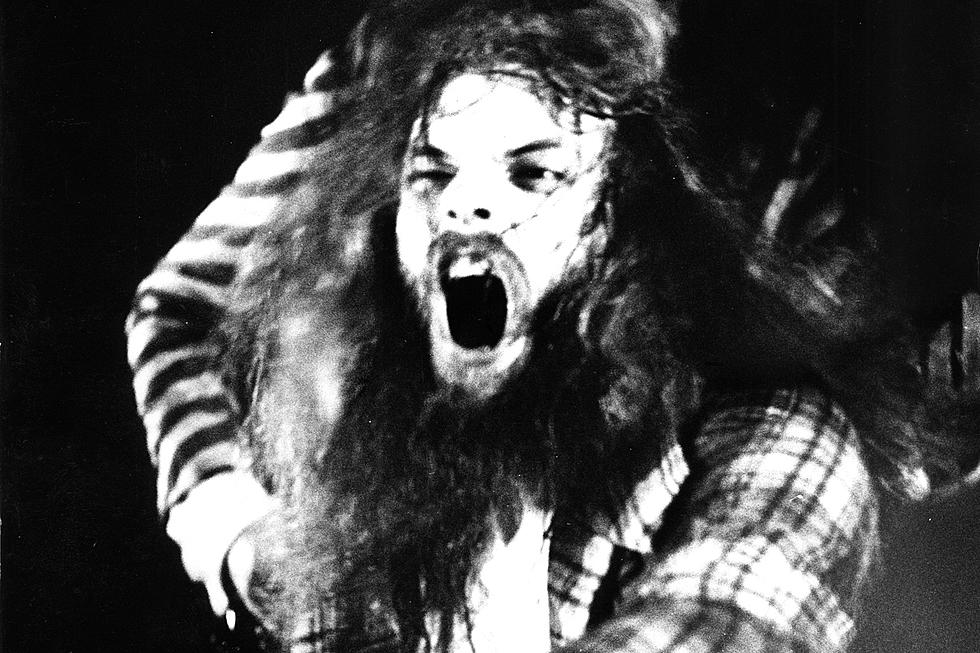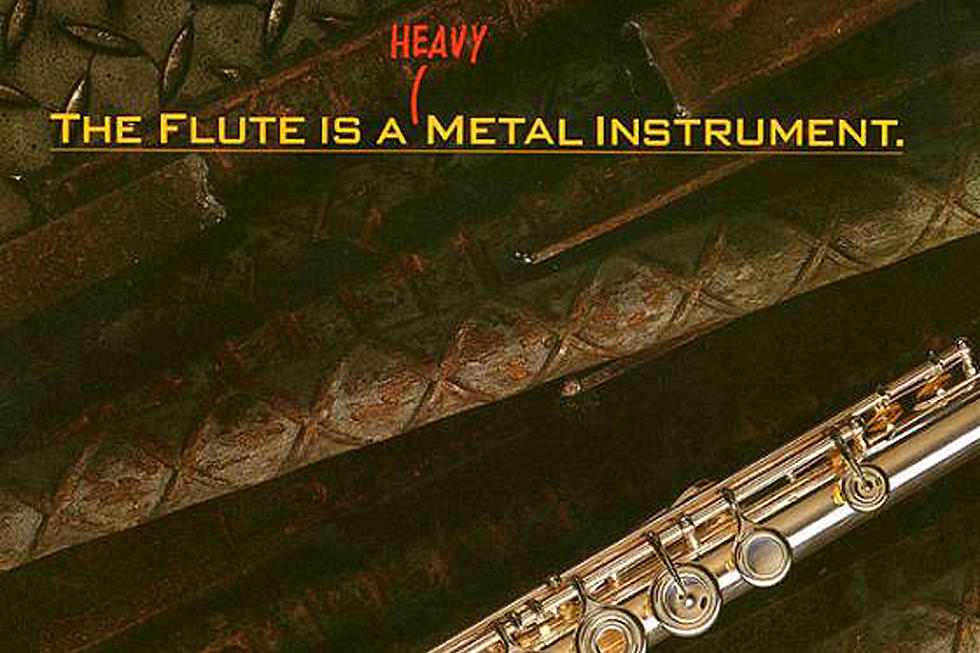
Martin Barre Talks About Jethro Tull Memories, New Music and More: Exclusive Interview
Jethro Tull played their last concert in 2011, when main songwriter Ian Anderson retired the band and moved forward under his own name and a revamped lineup. That decision came as a "personal shock" to Martin Barre, Tull's longest-serving non-Anderson member (at 43 years) and one of rock's most formidable guitarists. But the shift hasn't slowed him down one bit.
Barre has recorded a trio of solo LPs over the past three years, including Back to Steel, which he released last month. Like the Martin Barre Band live show, the album summarizes his varied musical interests: blues, traditional folk, hard and progressive rock, with vintage Tull tracks ("Skating Away," "Slow Marching Band") thrown in for good measure.
We recently spoke with Barre as he prepared for some upcoming gigs, as well as Yes' annual floating fest, Cruise to the Edge. Along the way, the guitarist discussed his new LP, the most underrated Tull album and his creative determination.
Your guitar work on Back to Steel is excellent, as usual. I especially enjoy the instrumental "Hammer."
I've always written instrumentals. With this album, I was trying to concentrate on songs –being a four-piece band, I like to do complete songs. But I just thought, "I've written a lot of instrumentals over the last five or six solo albums, so let's sit down and write something a bit uplifting, a bit upbeat." I just really had it in mind as something that would work really well onstage. It's good fun to play live.
I also really like "It's Getting Better" — that blend of bluesy stuff with the mandolins and other interesting textures.
I love using mandolins and bouzoukis, which I think is a great sound in rock music – ever since the Eagles used banjo. It's such a cool sound: a sharp, attacking little edge. Just on the periphery of the music. I really love doing that. It just sort of drives it along. I'm not aiming for anything but seeing where the music goes, and if it looks good, I keep pursuing it to the end. I really enjoy my songwriting and arranging.
It makes sense that you'd cover "Skating Away" on the album because that's a signature Tull tune. But I was surprised to see the more obscure "Slow Marching Band" from 1982's The Broadsword and the Beast — how did you decide on tackling that one?
We recorded that a year ago. And the recording was sitting, gathering dust. I'd finished the album. I wanted to add another Tull song to change the set and the arrangement to make it more personal. Every time I went back to that finished version of "Slow Marching Band," I just thought, "I love that song." And the only reason I recorded it is because I think it's one of the best Tull songs in the whole catalog. I also wanted to add girls' voices to it because that chorus is such a stirring line. I like it being the last track because it's a very anthemic piece of music.
It's interesting – ever since the end of Jethro Tull, you've been especially prolific with your solo career. Do you feel more freed up in a way to pursue another side of your musical personality?
I don't feel freed up. I didn't leave Jethro Tull because Jethro Tull finished. It's important that people realize there will never be a Jethro Tull again. There will be two solo bands: the Ian Anderson Band and the Martin Barre Band, and long may they exist, and long may they enjoy play music. I'm not being pedantic. I always hate to hear, "Oh, you've left Jethro Tull." I haven't really. Ian wanted to finish Jethro Tull, wanted to stop the band completely. I've had 43 years of fantastic memories, and I've loved working with all the musicians within the Jethro Tull family. So for me it was a big personal shock to finish, and luckily I've done solo albums, a few fun tours as a parallel to the Jethro Tull thing. So I had a leg up, but essentially the floor was pulled from underneath me, and I had a month to reorganize my life and start from the beginning again. I am free, but I wasn't looking for freedom. I already had it. It's important that people know I was always musically happy because I was able to do a solo album every three or four years when I had the time. I was able to get a little band and take them on the road. I've always had that option, and it was always really important to me because it enabled me to play the music Jethro Tull didn't have within the band. It was always great to have it, and obviously it's sort of musically natural to continue as a solo artist. But it was very difficult on a business footing, an emotional footing, and a practical footing. I've had four years, and I had two very difficult years and two very good years. I'm beginning to establish some sort of band reputation, and I love it because it's me – my neck's on the line, for better or worse. But I quite like that. I really like being put in the deep end. I've had a lot to do, but I thrive on it. Musically, it's been a fantastic thing for me to say, "Right, come on. You write music, don't you? You've written some songs? Okay then. Get back in the studio and show people what you've got."
There's a lot of gossip that goes on, and that doesn't do anybody any good. I'm a very happy person, and I believe Ian is a very happy person too. The end result is very good, but it has been very tricky. It's important to me because Jethro Tull, as an entity, doesn't exist. The work that was done by all these people – me, Dave Pegg, David Palmer, John Evan, Barrie Barlow, Eddie Jobson – all their work is really written in stone, and they were part of Jethro Tull. And now there is not a Jethro Tull. Maybe there will be in five or 10 years, but probably not. It doesn't exist in its pure form – in my mind, in any form. I'm not Jethro Tull. I'm playing 40 percent Tull tracks, but I'm not Jethro Tull at all. I'm Martin Barre.
Even thought it's horribly sad that Jethro Tull doesn't exist, the silver lining is that now there are these two entities touring and bringing more of the catalog to more people.
Yeah, I think that's the case. And I haven't necessarily played the music exactly how it was, so I can't be accused of being a lesser version of Jethro Tull – or Jethro Tull without the flute player. So I've been very careful to change it a little bit in a respectful way but put my stamp on it. But it's sad because I see bands like Fleetwood Mac and the Eagles and Toto out there having very successful tours. They're very special bands, and they're enjoying a resurgence of interest from that era. But unfortunately we're not part of that.
Jethro Tull's 1980 album, A, just celebrated its 35th anniversary. That's such a strange and unique album in the Tull catalog, especially since it originated from an Ian Anderson solo album. But it's very underrated in my opinion. Do you have any memories from that time?
Essentially it was going to be an Ian solo album. He wanted to do something a bit different, and we all thought, "Great, good idea!" At the time, I was beginning to write music and thinking about recording my own stuff. That's when Dave Pegg joined the band. He got a new drummer, Mark Craney, and Eddie Jobson. I was very humbled when Ian called and asked, "Do you want to play guitar on the album?" And I said, "It's a solo album – don't you want to work with somebody different to get a different take on the music? This is a very good opportunity to work with completely other people." And Ian said, "No, I want to work with you." Which was incredibly nice. Then, of course, at that point, I couldn't say no, and I wanted to do it anyway. So that's what happened. It changed. I think when the record label saw it was me and Ian and a bunch of really good songs, they persuaded Ian to make it a Jethro Tull album. There wasn't a Jethro Tull band because John Glascock had died, and Dave Pegg was new on the bass. It was a period of change within Jethro Tull anyway, so it was very natural that this solo album became Jethro Tull. But I agree – it was a lot of energy, that album. Eddie, Mark and Dave brought so much. It was a great combination of players.
I know you've considered putting together a tour with the classic Jethro Tull lineup – Barrie Barlow and John Evan and those guys. Have you thought any more about that?
Yeah, I have – in a very informal way. I talk to Barrie quite rarely. I love Clive Bunker, and he would definitely do it. And Barrie would definitely do it, so we'd have two drummers. Jeffrey Hammond wouldn't do it because he doesn't play music at all. And I don't think John would either because he stopped playing music, which is very sad. Sadly, Glenn [Cornick] passed away. It's a tricky one. It could happen. It could be good, but really if you're gonna do that, have Ian as well. Have everyone from every era that would do it: a big band that could come and play two songs, leave the stage. It could be a big, fabulous thing. But it's just an idea. Maybe a promoter with a lot of imagination and a lot of persuasion could pull that together, but right now I can't.
Yes did a similar thing in the early '90s where they brought these two versions of the band together for the Union tour.
That's fantastic. And, of course, it works because you've got such a huge catalog. The one thing I've always through Tull should do is the story of the band onstage. Start with the early days, even Mick Abrahams – I don't know if he can play, but if he could, the first song would be the original band playing some blues. It would be a big production through the years, and it morphs through different styles. It could be fantastic.
Speaking of Yes, I'm sure you heard about the passing of Chris Squire. I wondered if you have any memories of Chris or Yes.
Unfortunately, I only met [Squire] in a very informal way, just a few words every time we met. Being a guitar player, me and Steve [Howe] know each other very well. And I know Jon Anderson quite well. We've rarely played together, unfortunately. But the whole thing with [Squire's passing] was obviously devastating and very sudden, and I felt terrible for the band. It's very brave for them to continue in his memory and do the Cruise to the Edge project as a tribute to him. I'm sure they'll do it in a very proper and apt way.
This will be your first Cruise to the Edge — what sort of expectations do you have? Have you figured out your set list? Do you have any deep Tull tracks planned?
It's gonna be so much fun. I just hope we've got a very long set because I could play two-and-a-half, three hours of music. Well, I'd better not say that. But the whole thing will be a real pleasure because I'll be playing for people who've never heard us. They'll have no idea what they're going to hear, and for me, that's the best thing ever. I'm presuming and believing they're going to have a very pleasant surprise. I think the whole idea is really cool – it's a great concept, and I'm looking forward to it very much. The set we have now is very strong, and it's quite an eclectic mix of Tull classics and blues standards, and now we have the new CD to draw from. The difficulty with the set list is which ones not to play. I'm not really making any commitments. We sort of do what we do, and it will be a fair representation of what we've been doing this year. We'll have a strong Tull connection.
See Jethro Tull in the Top 100 Rock Albums of the ‘70s
This Day in Rock History: October 19
More From Ultimate Classic Rock









